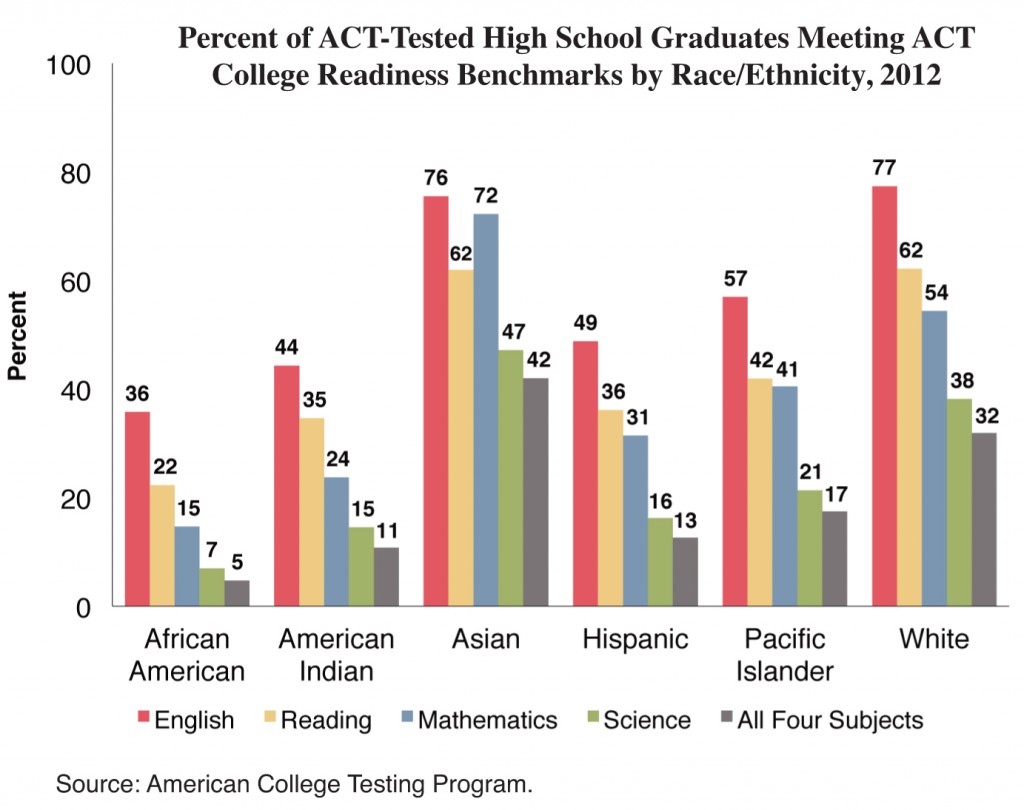 The American College Testing Program, the organization that administers the ACT college entrance examination, recently released its summary of the test scores of the 2012 high school graduating class.
The American College Testing Program, the organization that administers the ACT college entrance examination, recently released its summary of the test scores of the 2012 high school graduating class.
The ACT test is graded on a scale of 1 to 36, with 36 being the best possible score. In 2012, the average composite score for Whites was 23.6. For Blacks the average composite score was 17.0. Both Whites and Blacks had the identical average scores that they did a year ago.
Over the past five years the average composite score for Whites has increased from 22.9 to 23.6. During the same period, the average composite score for Blacks went from 16.9 to 17.0. Thus, over the past five years, the significant racial gap in ACT test scores has widened.
In addition, the ACT data shows that only 5 percent of Black ACT test takers met the organization’s college readiness standards in all four major subject areas: English, reading, mathematics, and sciences. For Whites, 32 percent met the minimum standards of college readiness in all four areas.



The white-black gap in ACT scores(and other similar metrics) will not close until the gap between the ability to have babies and the capacity to rear healthy — in all senses of the word– children closes. If the enslaved ancestors of contemporary blacks managed to rear productive, educated, responsible participants of this society in the face of de jure and de facto policies and practices designed to terrorize and deny them full humanity, how is it that the wealthiest and most highly-educated generation of African Americans is unable to do so?
Perhaps, if acquiring good academic and socially appropriate skills were highly prized in today’s black children, rather than being castigated as “acting white”, if acquiring vibrant vocabularies and knowledge of a world bigger than oneself were more important than acquiring bigger-screen TVs, then, academic performance might improve. The so-called ‘crack generation’ cannot continue to be assigned blame for today’s ills. So long as “me/now” (an infantile expectation at best)is the rule, there is not much hope. The notion of delayed gratification or sacrifice(both necessary practices in preparation for responible adulthood)seems somehow outrageous to contemporary black children and young adults, bordering on the blasphemous. Watchu mean I can’t… .
Children reach their highest postential when REQUIREMENTS,DEMANDS,LIMITS, AND BOUNDARIES (none of these being bad things)in all areas of their lives are set for them. They want to please those who(at least appear to)take an interest in them. Whether they are living up to parental expectations or down to the social demands spewed by 24/7 media outlets really doesn’t matter to them. If the former are lacking; the latter will do. How did that come to be?
Until the so-called grown-ups figure out all of the above, to get a sobering view of where black America seems to be headed unless something drastically changes, take a look at the chillingly prescient dystopic 1993 novel by Octavia Butler, set in 2025 Los Angeles, _The Parable of the Sower_.
Fill in a city or suburb near you.
so what is the ACT test range
The test is graded on a scale of 1 to 36